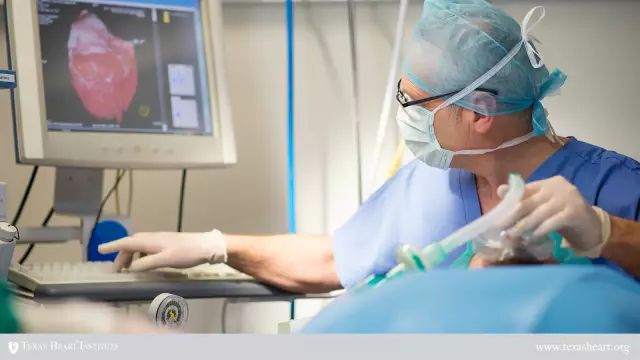- Author Rachel Wainwright wainwright@abchealthonline.com.
- Public 2023-12-15 07:39.
- Last modified 2025-11-02 20:14.
Thoracic surgeon
A thoracic surgeon is a medical specialist who deals with the diagnosis, prevention and surgical treatment of diseases of the chest organs.

Origin of the profession
Thoracic surgery has its origins in general surgery and was originally a field that dealt with the treatment of the mammary glands, heart, esophagus and lungs. In the 20th century, this direction separated into an independent discipline, and also such medical directions as pulmonology, vascular and cardiological surgery moved away from it. Currently, these areas are in close cooperation.
Thanks to the development of the specialty "thoracic surgeon", new possibilities of surgical treatment of diseases of the lungs, heart and mediastinum have appeared. The diagnostic capabilities have significantly expanded and new methods of histological examination have appeared, and the operations have ceased to be many hours and of increased complexity.
Features of the medical profession "thoracic surgeon"
A thoracic surgeon deals with the surgical treatment of injuries of the chest and internal organs, as well as diagnostics and treatment of inflammatory processes of the ribs, lungs, thyroid gland, esophagus and diaphragm.
A separate area is pediatric thoracic surgery. The pediatric thoracic surgeon treats newborns, children and adolescents under 16 years of age. During operations, a special endoscope for the thoracic cavity is used, which has an illuminated optical system and allows small incisions to be made.
Also, a pediatric thoracic surgeon diagnoses on a special monitor, can remove tumors and inflammations with small incisions of 3-5 cm.
Modern technologies allow the surgeon to operate on the chest and its organs in a sparing manner using effective equipment.
The thoracic surgeon treats pulmonary emphysema, pleurisy, atherosclerosis, mediastinal tumors, as well as malignant and benign tumors of the lungs, trachea, esophagus and diaphragm. In case of injuries of the chest and lungs, the surgeon performs an emergency surgery.
The main diagnostic methods are bronchoscopy, bronchography, radiography, thoracoscopy, echocardiography, ultrasound, spirography, computed tomography and MRI, isotope research.
In the early 2000s, methods of endoscopic surgical intervention were actively introduced, which have a low trauma rate and can be used both for children and for elderly patients.
Professional skills and qualities of a thoracic surgeon
A thoracic surgeon carries out medical activities in public and private institutions, including surgical departments of polyclinics and hospitals, in departments of thoracic surgery, dispensaries, research institutes, rehabilitation centers and private clinics.
This profession requires a high level of knowledge in the field of fundamental medicine and thoracic surgery, as well as high intelligence, confidence, responsibility and self-organization.
The thoracic surgeon must treat patients with understanding, attention, and accuracy, with good motor skills, finger mobility, focus and consistency.
This surgeon must possess modern diagnostic techniques, knowledge of anatomy, general physiology and medicine, and physiology of the chest organs. This specialist in treatment must use conservative and surgical methods, provide planned and emergency medical care, as well as carry out basic and additional manipulations, including dressing, stopping bleeding, suturing, artificial respiration, etc.
Found a mistake in the text? Select it and press Ctrl + Enter.






